People with anxiety, be aware: these dogs are your perfect emotional support!
Everybody has a little bit of anxiety at the job, at home, every month before knowing the bill’s price, and so on. While for many, anxiety is something that comes and goes, for others, having to deal with a lot of anxiety daily becomes a burden.
Therapy and medications are, of course, the best “cure” for anxiety, but what if I tell you that according to statistics and even therapists, there are some emotional support dog breeds that can help more than pills?
Dogs in particular have been used by people for centuries as companions and for therapeutic purposes. For example, certain breeds, such as Labrador retrievers, have established a reputation for being kind, intelligent, and emotional support dogs. Others, such as Cockapoos and Chihuahuas, are excellent at keeping us company during difficult times because a simple look in their eyes will melt your heart and make you feel instantly better.
But hey, I don’t want to spoil it for you now and give away all the emotional support dog breeds in the first lines of the article; just keep in mind that even on the rainiest days, there will be your dog to care for you and make you smile, regardless of how your anxiety manifests itself or how depressed you are.
Below you will find the list of dog breeds, along with how to take care of them and other details that every dog parent must know.
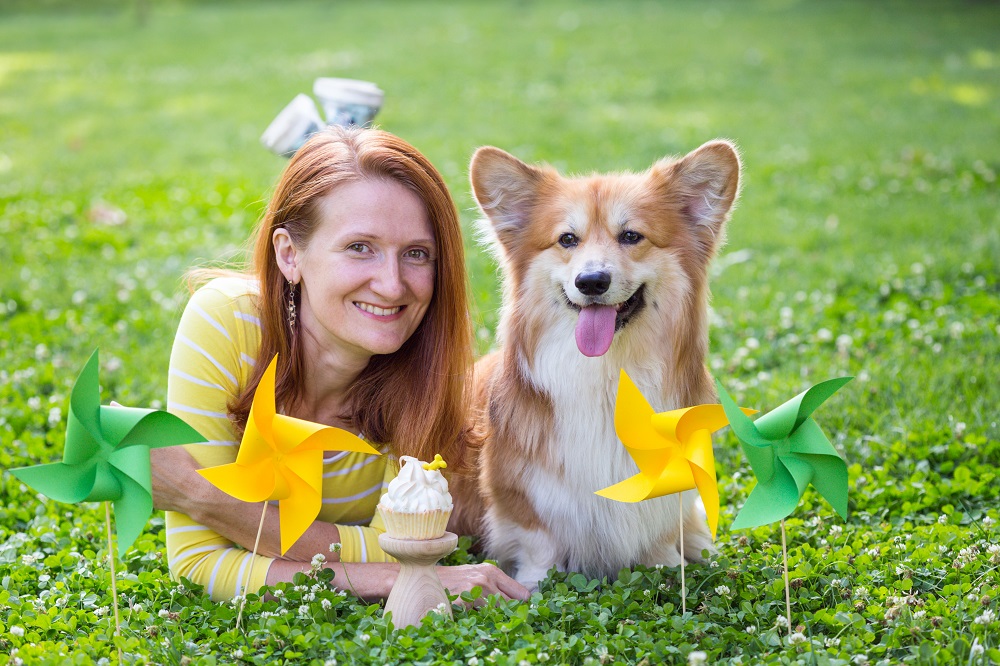
Pembroke Welsh Corgi
For people with anxiety, one of the best dog breeds is this cute little pie, the Pembroke Welsh Corgi. This breed has gained a lot of popularity in the past years, especially on social media, and since then, everyone has wanted to own one.
Obedient and loyal without being needy, this dog is usually 10-12 inches; it doesn’t weigh more than 40 pounds. Being an active pup, it will need a bit more walking than others, but that will do a lot of good for the owner to,o since one of the ways to combat anxiety is to spend a lot of time in nature, away from screens.
However, because they love walking more than other dogs, it’s important to also ensure they have a diet containing proteins, carbohydrates, and healthy fats.
Easily bonded to people, people with disabiliti,es and those living in nursing homes frequently adopt Pembroke Welsh Corgis as companion dogs.
The good thing about Corgis is that you don’t worry about mopping and vacuuming all day because this breed doesn’t shed a lot, but you must pay attention to its diet since too much food can lead to obesity. And no matter how much they will beg fo itr, never give your corgi chocolate, onions, garlic, grapes, or raisins!
Cocker Spaniel
Among the best emotional support dogs for people with anxiety is the Cocker Spaniel. Gentle, child-friendly, intelligent, super affectionate, and extremely loyal to its owners, this cutie that weighs a maximum of 30 pounds and is 16 inches is going to fit in every household.
If you decide to adopt this breed, you must also know they enjoy physical activity, but on a moderate level compared to Corgis, for example. They’re easy to train even by yourself, so you won’t need to spend a ton on going to a specialist.
Cocker Spaniels don’t shed, so I am happy to say that their fluffiness is off the charts. Of course, you will need to brush their fur once in a while, but not as often as other breeds.
Adult Cocker Spaniels should generally be fed dog food with at least 18% protein; chocolate and dairy products should be avoided as they are extremely toxic to this breed.
Yorkshire Terrier (Yorkie)
Aww! I am meltingjust byt seeing a Yorkie’s face! Considered a teacup dog breed because of their extremely petite size, this breed is perfect for people with anxiety.
Feisty, energetic, adorable, loyal, but also pretty calm at times, this breed was one of the first recorded therapy dogs. This small breed has a lot to offer with a history like that, an aptitude to form close relationships with their owners, and the capacity to travel anywhere in a shoulder bag.
If you decide to adopt a Yorkie, you must know that they love cooked veggies and fruits, but in moderation, because they can cause stomach ache,s and healthy fats from dairy products. Of course, it’s recommended to stick to a high-quality dog food brand, but if you don’t know for sure which one suits its needs, ask your vet.
Even though avocados are excellent for human health, you should never give your dog even a small amount of them because the ingredient called persin found in them is extremely toxic. Feeding raisins and grapes to your pooch can also harm the kidneys.
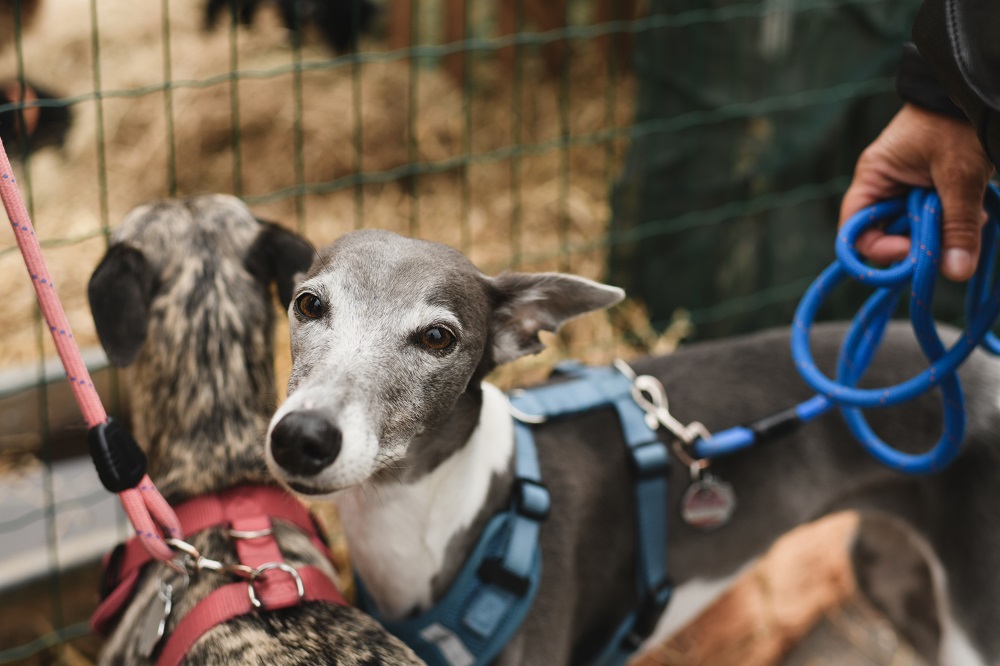
Greyhound
Compared to other dog breeds for people with anxiety, the Greyhound is a bit bigger, so you might need more space if you plan on keeping it indoors. They grow up to 27-30 inches, and if they’re well-fed, they can reach 60-70 pounds, which is a normal amount for a healthy Greyhound.
These lovable, gentle giants, many of whom are retired racetrack rescues and who are up to running 35 miles per hour, will enjoy snuggling with you in bed all day long.
They make excellent living companions because they are incredibly sweet, docile (they hardly ever bark, so if you’re living in an apartment, you won’t hear complaints from neighbors), and have soft, silky coats. More? They lean their bodies, which weigh hundreds of pounds, against their human legs to hug them. Isn’t that cute?
Furthermore, you might get ready to feed the pooch with a lot of food because they’re quite big, they need more food than other breeds mentioned above. From both wet and dry dog food, you can also cook meat, poultry, and eggs to give to your Greyhound.
The good news about this breed is that it doesn’t shed that often, and when it does, you will notice it, so it will be easier to dispose of it right away.
Pug
Maybe you didn’t know,w but these small (13 inches) but robust dogs were bred as emperors’ companions in ancient China. Later, the monarchs of the Netherlands and Britain chose them. Pugs, celebrated for their playful personalities, can be the perfect emotional support for someone with anxiety. They have a wonderful ability to adapt and offer unconditional love and devotion whenever their human needs it.
Since they have issues with breathing because of their flat noses, they might not enjoy being dragged anywhere, especially if you’re in a hurry. So if you’re a rather lazy person, don’t worry because the pug won’t be sad if you’re staying most of the time indoors. Oh, and they might snore a bit too!
The only downside of having a pug as a pet is that they shed a lot, so you will have to use a special brush for grooming regularly. I recommend it at least twice a week.
I recommend the Hertzko Self Cleaning Slicker Brush that you can find on Amazon for a good deal, and it’s been loved by a lot of customers, saying it’s better than the Furminator. You won’t know if you don’t try it!
Papillon
Papillons are loving canines that get along well with kids. Although they can be very alert and are regarded as a vocal breed, they are amiable toward strangers. These characteristics can help them be good watchdogs because they will let you know about anything they think is unusual.
Papillons are very energetic despite their delicate appearance. They are the epitome of a high-energy dog in a small package because they love playing and exercising and thrive on activity. Although playing outside is their favorite activity, they develop close relationships with their owners and are frequently characterized as cuddle lovers who value spending time in their human companions’ laps.
Since they have quite a bit more fur than other dogs, their beautiful silky coat needs a bit more attention, but for sure, you don’t have to brush it daily.
High-quality animal-based protein sources, like beef, chicken, turkey, lamb, duck, eggs, and fish, should be a part of your dog’s diet. Although they like home-cooked meals, it is advised that they only eat their food, whether it is wet or dry.
Cavalier King Charles Spaniel
Everybody loves Cavalier King Charles Spaniels! There is no exception. These dogs are a good match for people with anxiety because they’re easy to take care of, they’re small (12-13 inches), they weigh around 18 pounds, and their life expectancy is up to 15 years, which means you’re going to enjoy their company a lot.
People with anxiety issues often find themselves worrying a lot about something, dealing with panic attacks, or having excessive fear regarding an event; therefore, they won’t be in a good mood most of the time. The good news is that the adorable Cavalier King Charles Spaniel is famous for its ability to adjust to their owners’ daily schedules and will gladly meet you wherever you are on any given day.
Eager to cuddle and show you affection, this little fellow will also like indoor stays, especially during the cold season. Royal Canin Cavalier King Charles Puppy Dry Dog Food is the best type of food for this dog breed, but it’s better to avoid chicken and beef since they’re allergic to both.
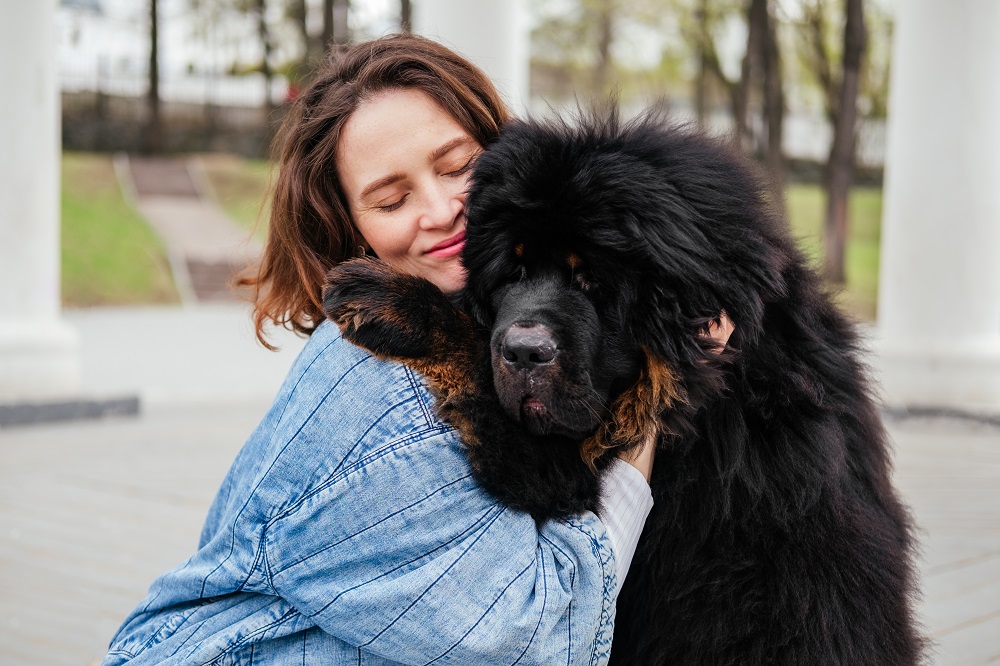
Newfoundland
Around the one and only fluffy Newfoundland, a giant weighing 150 pounds and 28 inches, it’s difficult not to feel safe and secure. And of course, loved! Despite their intimidating appearance and the fact that they take up a lot of room, particularly in apartments, these dogs are well-known for their patience and capacity to comfort and delight people of all ages, particularly those suffering from dementia, anxiety, or depression.
However, if you decide that a Newfoundland is worth your love and attention, there are some things that you should know before adopting one. They love walking in the park, but since it’s a dog suitable for people with certain mental issues and seniors, they don’t mind if you don’t run marathons. Since they’re quite large, expect your pooch to eat a lot, especially in the first years of life, and if you’re lucky, it won’t be a picky eater.
As with other dog breeds, avoiding giving them chocolate, too much dairy, or raisins is mandatory. Stick to the food your vet recommended, and it will be just fine.
German Shepherd
We all know the cute German shepherd, but not many people want to adopt one, especially if they have limited space indoors. In reality, these dogs are like big teddy bears, already with their fluffy fur for some petting and cuddles, even if they might seem a bit intimidating at first.
If you are one of the people with anxiety who needs to cling to your dog, German Shepherds will be there to support you and make you feel secure because they are instinctive protectors and are easy to train.
Regarding food, chicken, beef, turkey, lamb, salmon, and rabbit are all good foods for German Shepherds. Both homemade cooked and kibble. Just be ready to spend a lot on it since it’s a big dog, and they need a bit more food than other dogs on the list. Maybe as much as a Newfoundland.
French Bulldog
The popularity that this cuddly lapdog has gained is well-deserved. Frenchies are adaptable, calm, and love to cuddle up to someone during tough days. These sweethearts make wonderful roommates, especially for people with anxiety, but training can be challenging due to their stubborn nature, so it’s advisable to consult a specialist if you’re not patient.
Frenchies don’t shed much because of their short hair, so that shouldn’t be an issue. Brushing them once a week is sufficient. They’re playful and alert, enjoying the outdoors with running and jumping, but they also cherish their indoor time with their beloved owner.
Furthermore, a word of caution: French Bulldogs are prone to several illnesses like ear infections, back injuries, Cherry Eye, and, diarrhea. We recommend considering a different breed if you’re worried about vet bills and dog medication.
Dachshund
Wiener dogs are playful, loving, and naturally funny. Their daily strolls around town will make you laugh so much that fear won’t have a chance to surface. They are sensitive but intelligent, so use tactful training methods. A Dachshund’s life expectancy is approximately 16 years, so celebrate because it will be around for a long time.
Similar to Frenchies, they shed little because of their short hair, so once or twice a week might be enough time for brushing. Don’t be afraid to give your wiener dog human foods like lean meats (chicken, turkey), certain fruits (apples, blueberries), and vegetables (carrots, green beans) because they’re going to love it.
However, keep them away from onions, garlic, chocolate, and grapes. Feed them in moderation because even if they’re small dogs, they’re also prone to obesity. Furthermore, if you plan on changing the kibbles, consult with your vet first.
Miniature American Shepherd
If the German Shepherd won your heart but you don’t have the necessary space for it, then you’re going to love the Miniature American Shepherd! Reaching adulthood, your pooch won’t measure more than 18 inches and 40 pounds. This breed is very easy to train; they’re smart, they learn things fast, and they love their owners more than themselves. This is exactly what a person with anxiety needs: a reliable dog to look after them and support them whenever life is hard.
For people who prefer constant company but aren’t ready to have a huge Saint Bernard running around their house, these blue-eyed beauties make the perfect medium-sized dogs.
Shih Tzu
One more lap dog ready to cuddle! Since Shih Tzus have been kept as pets for centuries, they are skilled at reducing stress, helping people with anxiety, and promoting peaceful evenings. These small dogs are excellent with children and have a long lifespan, so you can expect to have your emotional support dog for many more years.
Adaptable and affectionate, the tiny Shih Tzu has a life expectancy of 18 years; the shedding factor is very low, so don’t worry about brushing that often, and during summer, you can also trim its fur.
Poodle
Poodles have a loving and playful side, and their easily trained personalities and beautiful fur coats make them excellent show dogs. They are highly intelligent dogs that are sensitive to your emotions. If they sense that you’re feeling nervous or anxious, they will take the initiative to cuddle or seek your attention.
Which one is your favorite? Tell me in the comments.
If you enjoyed reading this article, you may also like 8 Amusing Canine Habits That ALWAYS Make Us Smile.








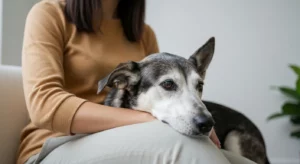



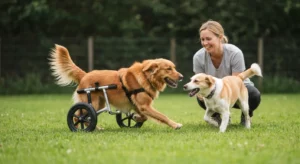
One Response